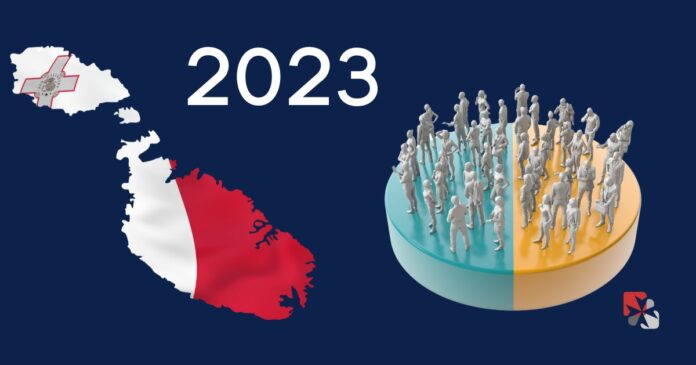Malta’s extraordinary 28.3% demographic growth over the past decade, outpacing other European countries, and its implications for the island nation’s future.
Malta, the smallest member state in the European Union in terms of land area, has witnessed a remarkable demographic surge over the last decade, according to recent statistics published by Eurostat, the statistical office of the European Union. With a population increase of 28.3%, Malta leads all other European countries in terms of demographic change.
This demographic shift is not just a number; it reflects a significant transformation in the social and economic landscape of Malta. In 2013, Malta’s population stood at 422,509. Fast forward to the beginning of this year, and the population has swelled to 542,051 – an increase of 119,542 people in just ten years, with a substantial addition of 21,080 people between 2022 and 2023 alone.
Malta’s population growth starkly contrasts with the demographic trends in other European countries. For instance, Luxembourg and Iceland, two of Europe’s other smaller nations, follow Malta with growth rates of 23% and 20.5% respectively. Meanwhile, Turkey and Ireland trail with 12.76% and 12.68% increases. On the opposite end, several countries, particularly in Eastern Europe, have witnessed a decline in population growth, with Italy experiencing a -1.49% decrease and Moldova a significant -29.4% drop.
Demographic increase abroad
This trend of Malta’s population growth is further accentuated by the increase in its foreign-born population. In 2011, Malta had 33,591 foreign-born residents. By 2022, this number had leapt to nearly 122,930, marking a staggering 266% increase. This influx has contributed significantly to Malta’s demographic profile, making it one of the most densely populated countries in the EU.
The implications of this demographic change are profound. Malta, renowned for its density, now faces the challenge of accommodating its growing population on its limited land. Comparatively, France, the largest EU country by land area, has only seen a 3.76% population increase in the last decade.
The demographic composition of Malta has also evolved. According to the National Statistics Office (NSO), 83.1% of the migrants in 2022 were third-country nationals. By the start of 2022, approximately 23.6% of Malta’s population was born abroad. Notably, males constituted 65.8% of the migrants arriving in Malta in 2022. The most common age group in Malta, as of December 2022, was between 30 and 34 years, accounting for 9.74% of the population.
The effects of demographic growth on future political choices
This demographic upsurge has become a focal point in Maltese national politics. Opposition leader Bernard Grech has argued that Malta needs to shift from a “quantity-focused economy” to one emphasizing quality. Finance Minister Clyde Caruana echoed this sentiment, stating that Malta must revise its economic model as projections show the country’s population could expand to 800,000 by 2040 to maintain its current economic growth rate.
Malta’s demographic journey over the past decade is not just a tale of numbers but a narrative of a nation at a crossroads. The country now stands at a pivotal moment, needing to balance its economic ambitions with the realities of its demographic expansion. How Malta navigates this demographic transition will be crucial in shaping its future, making it a case study for small nations grappling with similar challenges worldwide.





